Updated 1 year ago
5 Best RV Solar Panels to Make Your Camping Trip Greener
Written by
Jamie Smith
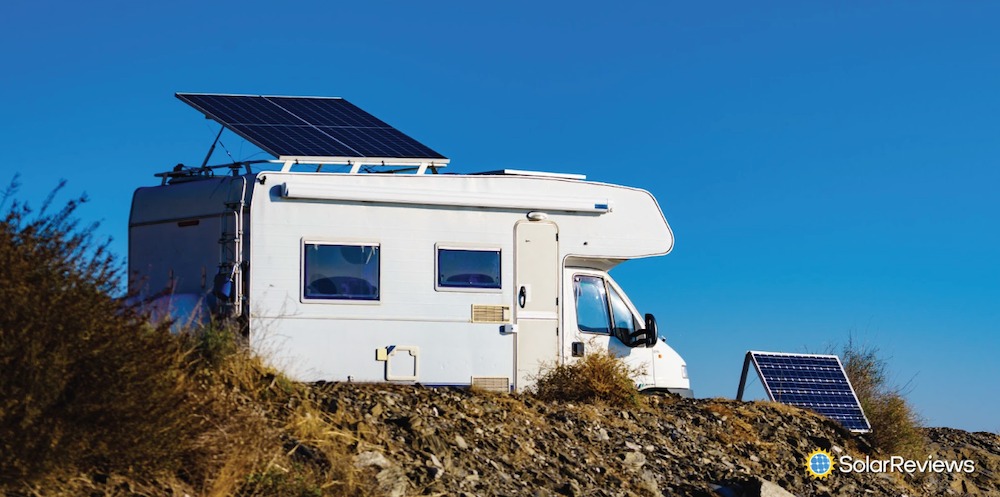
Find out what solar panels will cost for you
There’s nothing quite like going out into the Great Outdoors to escape it all. But having a noisy gas generator going in the background can snap you right back to reality.
To make your RV camping experience the quiet getaway you’re looking for; you may want to consider getting the best RV solar panels. Not only do they keep the noise level down, they keep pollution down, too!
However, finding the right RV solar panels can be tricky. Luckily, we’ve sourced out our top five picks for the best RV solar panels.
Product | Key features | Price |
|---|---|---|
(4) 100 W panels, charge controller, mounting equipment, cabling, Bluetooth module | $739.99 | |
(2) 200 W panels, charge controller, mounting equipment, cabling | $699.99 | |
(1) 200 W flexible solar panel | $599.99 | |
(1) 200 W foldable solar panel, Jackery portable generator (sold separately) | $699.00 | |
(1) 420 W foldable solar panel, Bluetti portable generator (sold separately) | $799.00 |
Top 5 best RV solar panels
Our experts at SolarReviews picked five solar panel kits for RVs and motorhomes to help you narrow down your search.
1. Best overall RV solar panel: Renogy 400 Watt 12 Volt Solar RV Kit
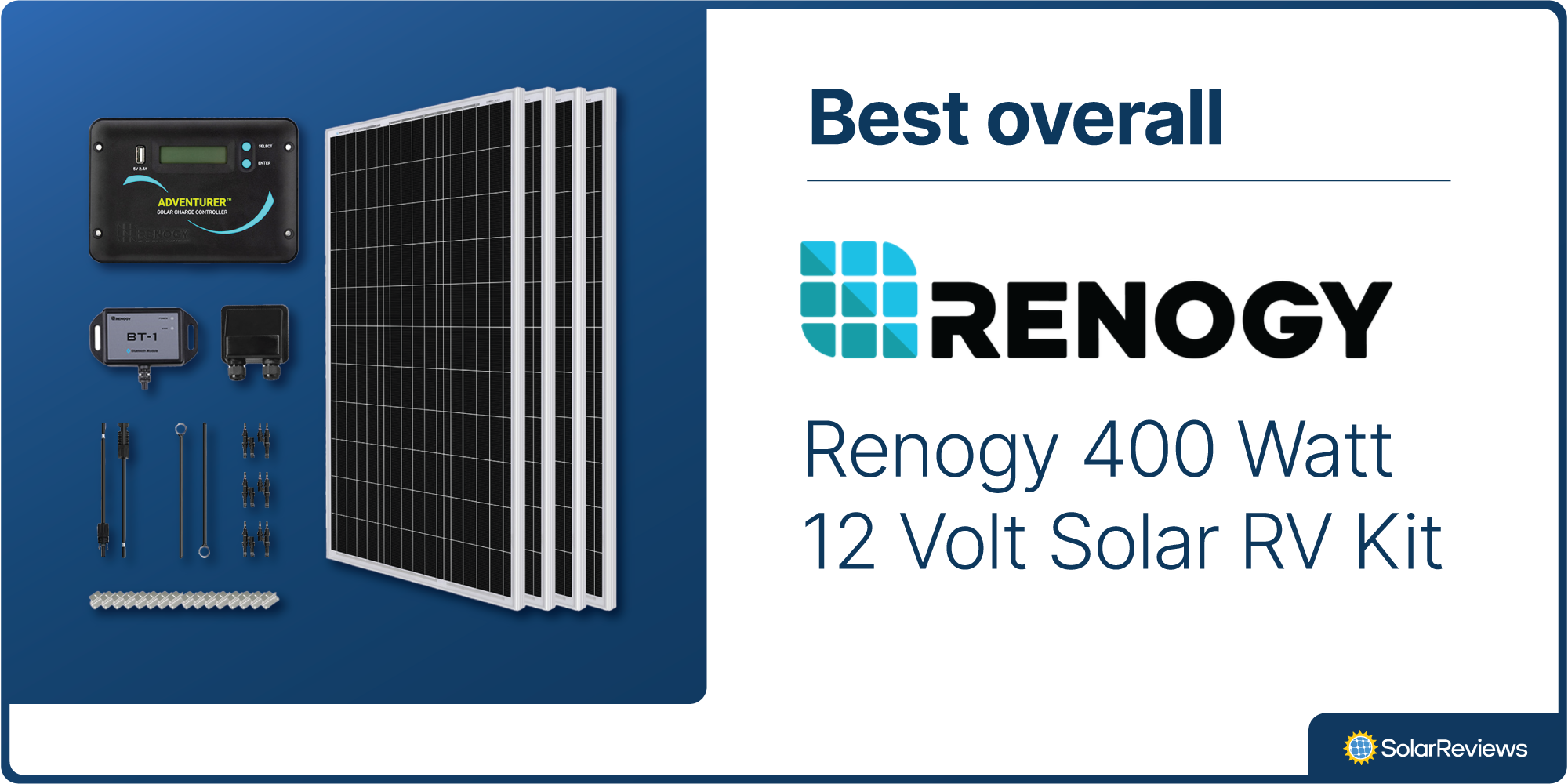
Renogy’s 400-watt solar kit gets our pick for the best overall RV solar kit. The kit includes four 100-watt monocrystalline solar panels, a 40 Amp MPPT solar charge controller, four Z-Brackets for mounting, and Renogy’s Bluetooth module – which lets you monitor and manage the system from your smartphone. The panels can be installed on your RV roof with ease.
The panels themselves come with a stellar 25-year production warranty and an efficiency rating of 21%. The 400 watts of power between all four panels included in this kit is more than enough to power small appliances for short periods of time during off-grid trips in your RV. Renogy typically has deals for their solar panel kits; try to snag one while you can!
Pros
-
400 watts of power between all four panels, covering plenty of usage
-
High efficiency rating
-
Easy to DIY
Cons
-
Needs ample amount of space between all parts
-
High cost
-
Batteries and inverter not included
2. Runner-up RV solar panel: Rich Solar 400 Watt Solar Kit
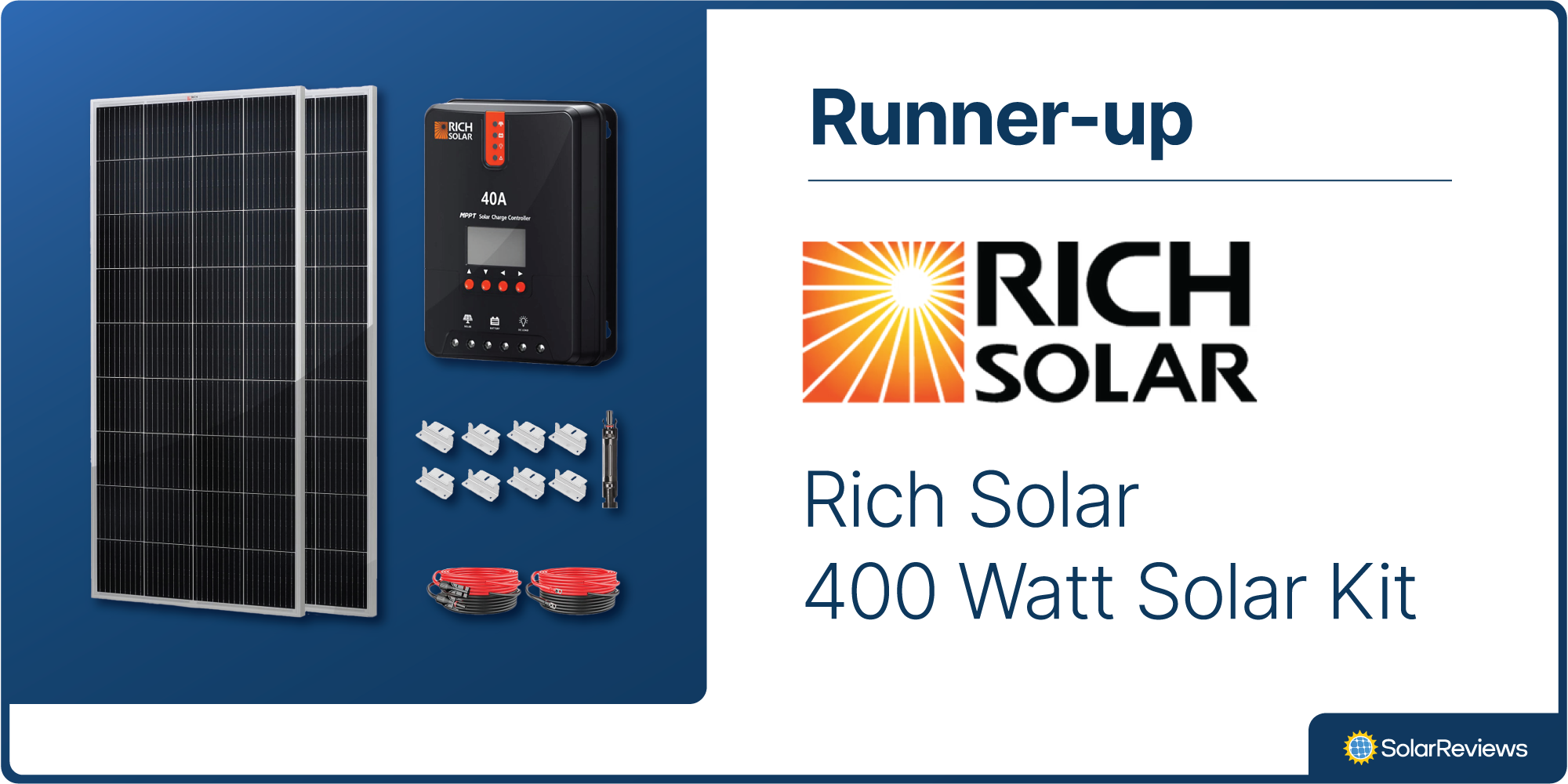
We chose Rich Solar’s 400-Watt Solar Kit as our runner-up for best RV solar panels. This kit packs quite the punch and comes with most of the essential items needed for the best RV solar use. This kit includes two 200-watt monocrystalline panels, a 40 Amp MPPT solar charge controller, four Z-brackets, and necessary connector cables for easy installation.
This reliable kit also comes with a 25-year output warranty and can be expanded to 600 watts on a 12-volt battery system!
Pros
-
Expandable up to 600 watts to power more appliances
-
Requires less space with two 200-watt panels
-
Good warranty coverage
Cons
-
Kit does not include inverter or battery; making additional purchases necessary
-
High cost
-
Does not come with a product warranty
3. Best portable RV solar setup: Yuma 200 Watt Flexible Solar Panel by BougeRV
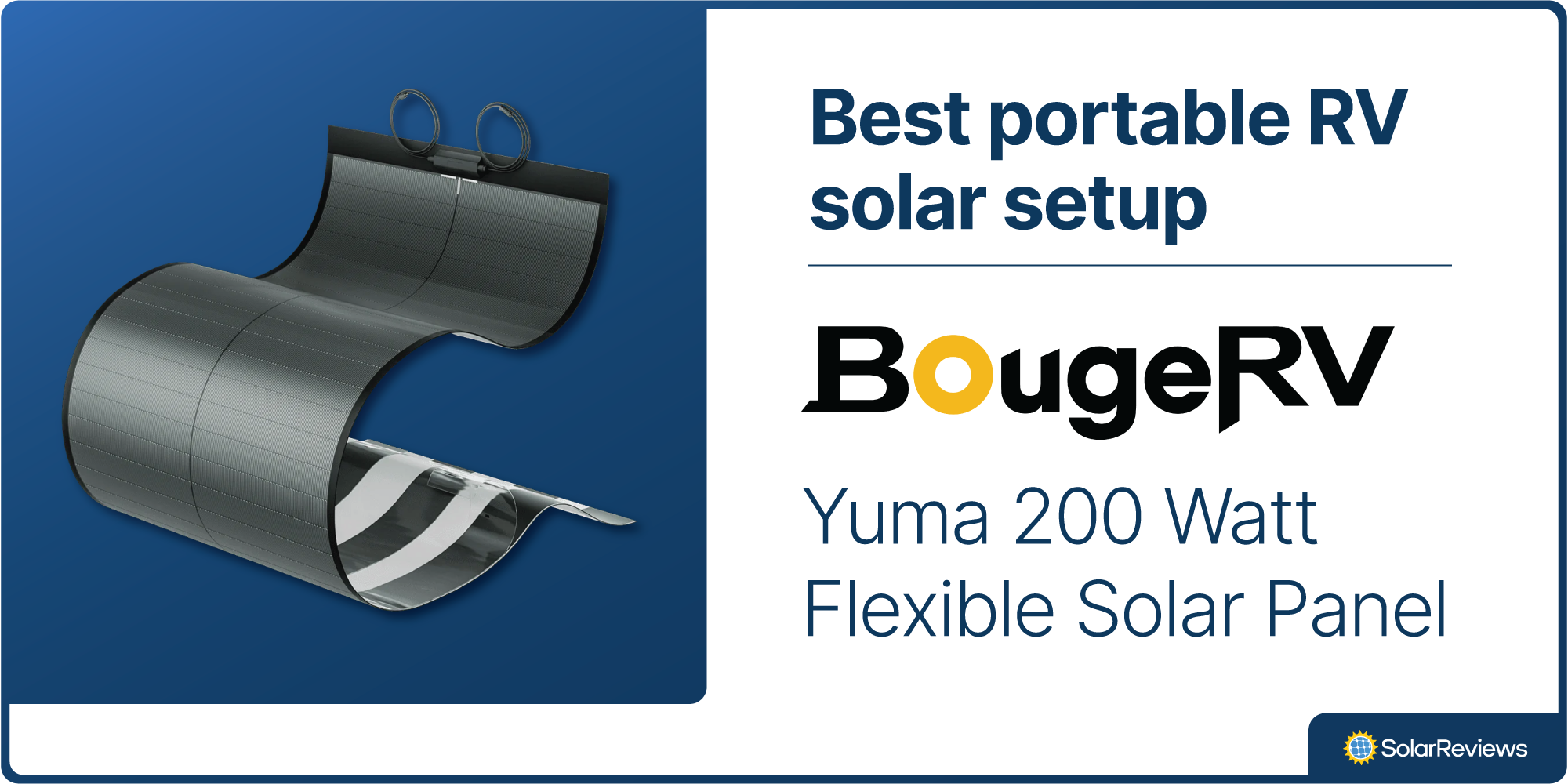
We chose the Yuma 200-watt flexible solar panel offered by BougeRV as our favorite portable RV solar panel. This panel is extremely lightweight and flexible, making it easy to travel with and store away. It utilizes CIGS technology, a highly efficient material commonly used for thin-film solar panels.
The Yuma panel offers 17% efficiency, which falls within the standard for CIGS technology. It also comes with a 10-year product warranty and a 25-year power output warranty, which will provide plenty of coverage in the event of any faults.
Pros
-
Lightweight and flexible for easy mobility and storage
-
Excellent low-light and high-temperature performance
-
Durable design with good warranty coverage
Cons
-
Comes at a higher price without coupon codes
-
Is not sold as a kit; all parts are an additional cost
-
Somewhat larger surface area than similarly powerful silicon panels
4. Highest efficiency RV solar panel: Jackery SolarSaga 200W Solar Panel
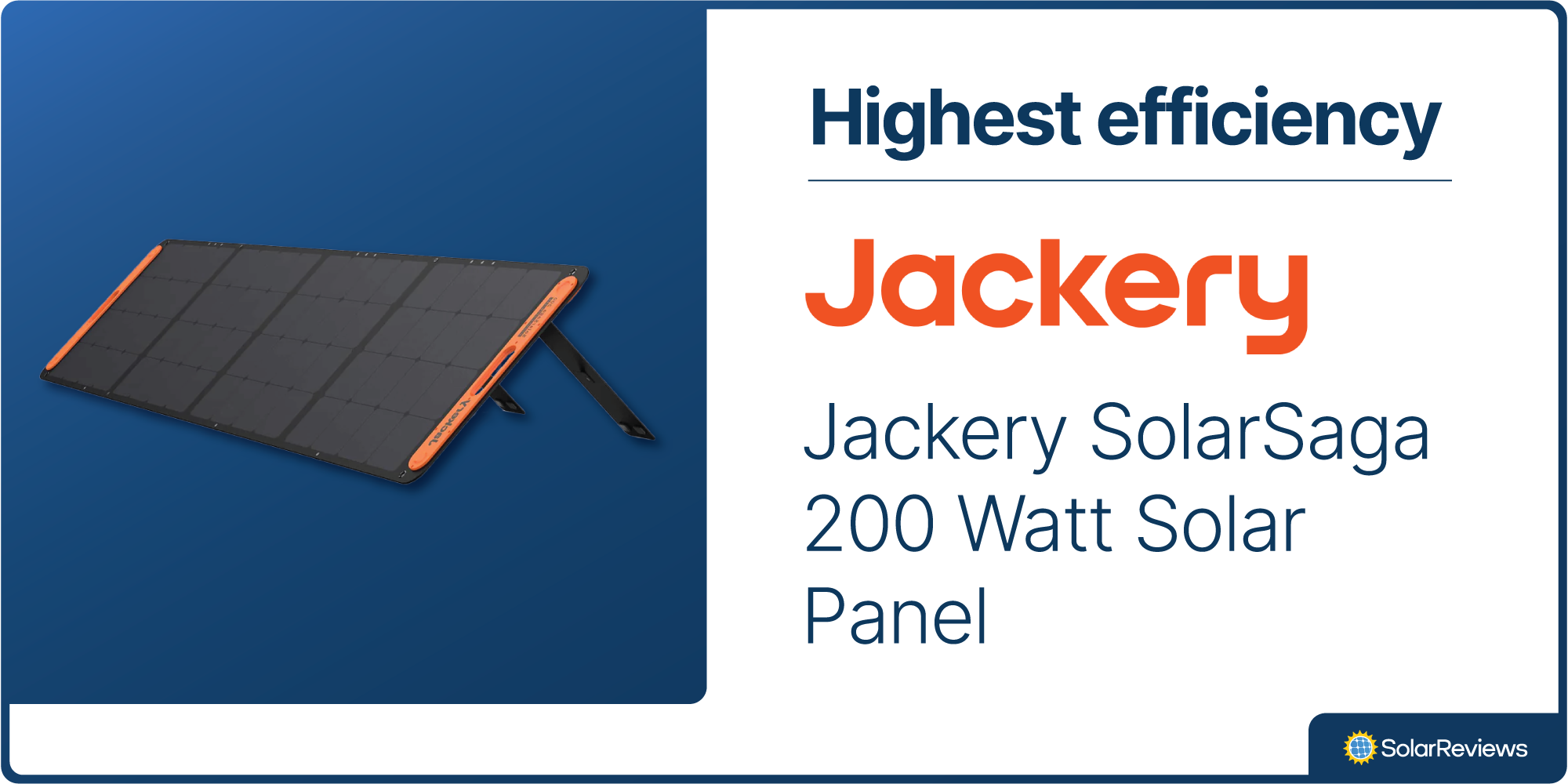
The SolarSaga 200-watt solar panel from Jackery is a perfect outdoor solution for your next RV camping trip. This folding solar panel offers a staggering 24.3% efficiency rate. It is designed to be long-lasting in virtually any setting and has a functioning temperature range of -4 to 149 degrees Fahrenheit.
The SolarSaga panel comes with a 3-year warranty and a free 2-year warranty extension from a trusted brand – and is meant to be paired with Jackery’s portable power stations. In fact, Jackey offers bundles, selling panels and solar generators together in a package deal. You probably won’t be attaching this panel to your RV’s roof, but it’ll still provide you the power to run your camping setup.
Pros
-
Great efficiency rate
-
Comes from a reliable brand
-
Portable and easy to carry
Cons
-
Generators sold separately, kits can get pricey
-
Other folding panels offer higher power ratings
-
Might need to buy multiple panels to meet your power needs
5. Most reliable RV solar panel brand: BLUETTI PV420 Solar Panel
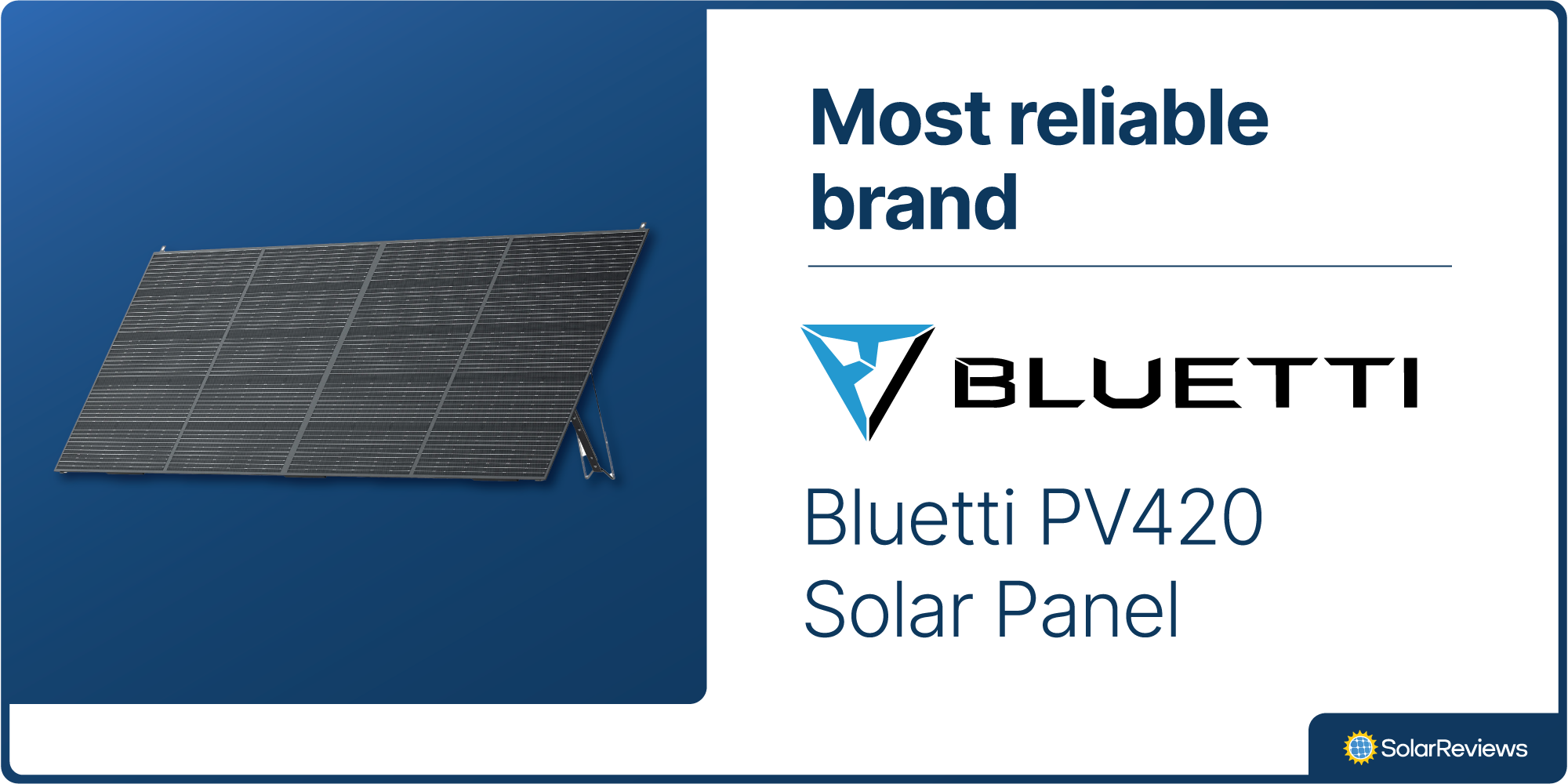
Last but not least, the portable solar panel from Bluetti may be small, but it’s mighty. This 420-watt folding solar panel is very durable and offers up to 23.4% efficiency, which is excellent for making the most of solar power on camping trips.
Its foldable design makes for easy storage and set-up. The panel also has an adjustable kickstand on the back so you can angle it perfectly in the sun’s direction. The PV420 panel can pair perfectly with any of Bluetti’s selection of portable generators for fast charging and providing power to any of your devices, small or large.
Pros
-
Reliable company with great product selection
-
High efficiency rate
-
Lightweight and easy to take on-the-go
Cons
-
Only comes with a 1-year warranty
-
Pricey
-
Generators sold separately
How much do RV solar panels cost?
Solar panels catered for RV use can range from below $100 to upwards of $2,000. It all depends on how big of a solar project you plan to invest in.
If you’re looking to start small and power a few devices, try looking for solar-powered battery banks for your smartphone, tablet, or smartwatch.
On the other hand, if you’re a seasoned RV’er who’s looking to add solar into your camping lifestyle, RV solar systems are the way to go. Those kits will be on the more expensive end but are convenient for a DIY solar project and can power your entire getaway!
How many solar panels do I need to run an RV?
On average, you’ll need between 200 and 600 watts of solar power to power the necessary items on your RV.
However, the exact number of solar panels you’ll need to power your RV or camper will depend on your needs. For example, if you plan on camping for a short period of time, a simple set-up is likely all you’ll need. If you’re boondocking full-time, you might need more power and storage to meet your energy needs.
Also, keep in mind how many appliances you’ll need to run. Does your camper come with a fridge? An electric oven? If you have more essential appliances, you’ll need more power.
What are RV solar panels?
RV solar panels function just like regular solar panels — they convert sunlight into electricity. Except in this scenario, instead of powering your home, the solar panels charge your RV’s batteries and appliances.
RVs have batteries within them that are able to power lights and small appliances but don’t last very long. If you want to be able to use other things like a microwave and TV, then you’re going to need external power, and RV solar systems can be the perfect solution.
RV solar panels can attach to the roof of your vehicle, so you don’t have to worry about panels taking up space. But you can also power your RV using portable solar panels to angle the panels in the sunniest, most optimal places for solar energy production.
Components of an RV solar panel system
Solar panels for RV use are typically sold together in a kit and consist of 4 main components:
Solar panels
A charge controller to prevent your battery from overcharging
An inverter to convert the DC solar electricity into usable AC power
A battery to store the electricity
What to consider when buying RV solar panels
Determining the best RV solar panels for you will depend on various factors catering to your needs. To help you narrow it down, here are a few things to consider when buying RV solar panels:
Your power consumption: Most RV campers use about 20 kilowatt hours (kWh) of electricity daily. The more appliances you have, the higher your electricity usage will be, and thus – the more solar panels you’ll need.
Your system setup: Solar panels for RV use can either be mounted on the roof of your camper or manually set up with portable solar panels.
Type of solar panels: Different types of solar panels will give you different results. We recommend monocrystalline or polycrystalline for your RV project, but if you have an RV with a curved roof, like an Airstream, flexible thin-film panels may be the way to go.
Batteries: If you're using solar panels for your RV, you’ll want to get some additional battery banks to store your solar energy. Lead-acid batteries are common for RV use, but portable lithium-ion batteries are becoming more popular.
Are RV solar panels worth it?
It depends on your specific needs!
Overall, there’s a lot to consider before buying RV solar panels. With limited space and limited power output, it can be difficult to figure out exactly what you need from an RV solar system.
If you’re a frequent boondocker, it’s worth it to at least pair your generator with a set of solar panels. The RV solar panel kits we listed are sure to be a great starting point for transitioning to solar energy.
But why stop at your RV? The best home solar panels can power your whole house, saving you money and helping the environment. Our solar panel calculator can tell you how much solar can save you on your specific home.
Jamie is a content writer and researcher with a B.S. in Communications from La Salle University, where she focused on journalism, mass media, and public relations. As a former member of the SolarReviews editorial team, she created content to help homeowners better understand solar energy and make informed decisions. Prior to joining SolarReviews, she worked at a marketing company producing long-form stories and interviews that highlighted small ...
Learn more about Jamie Smith